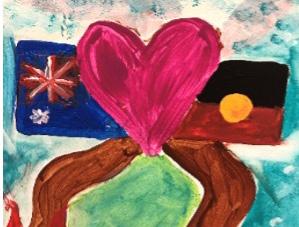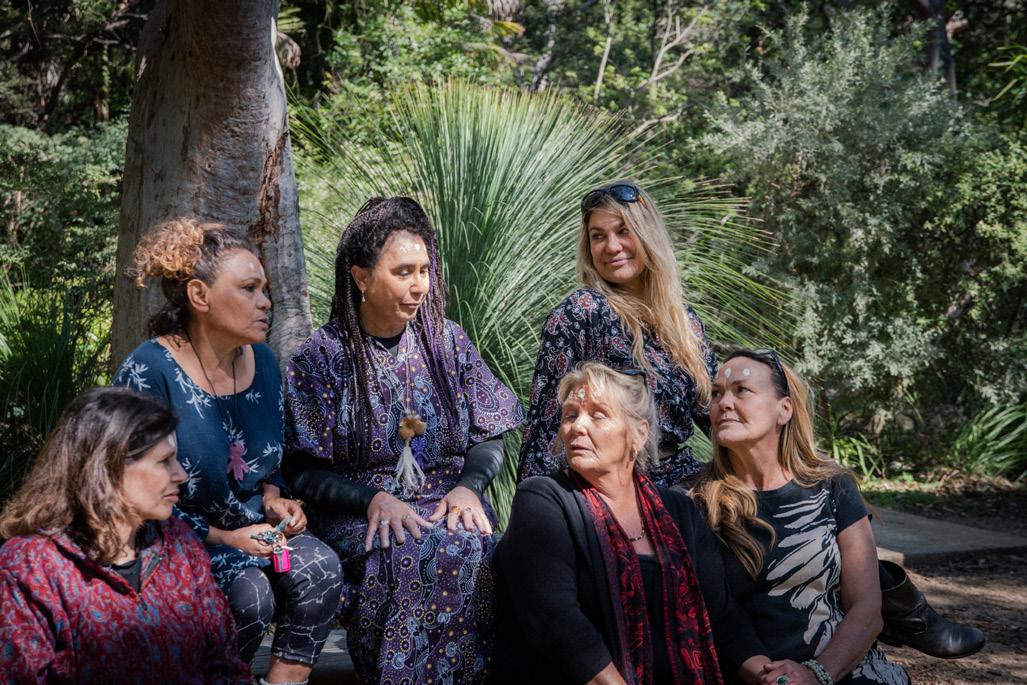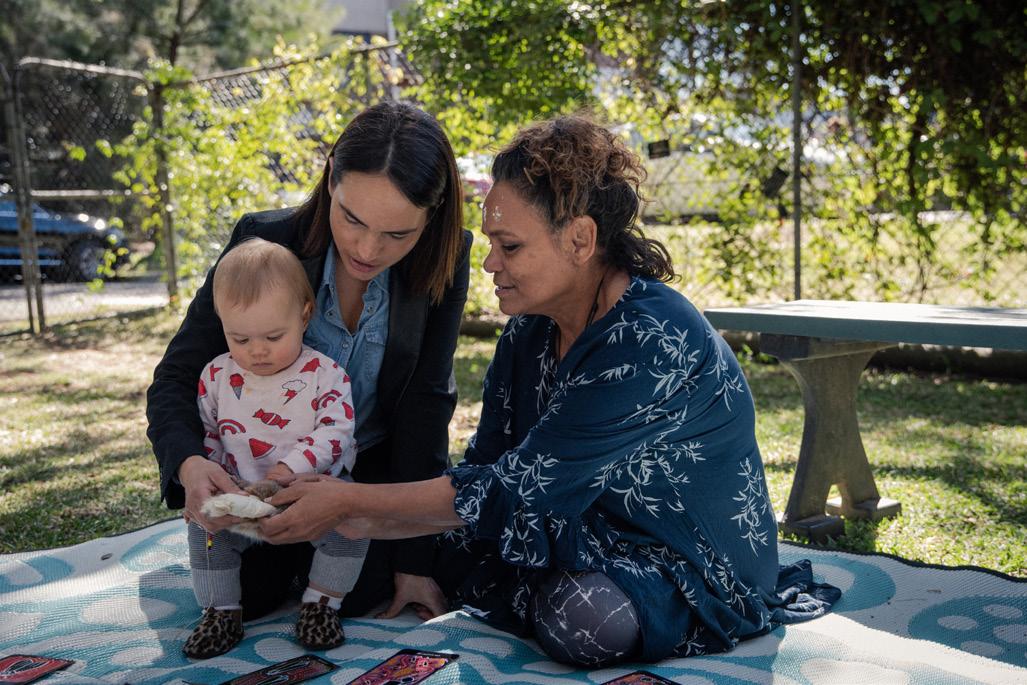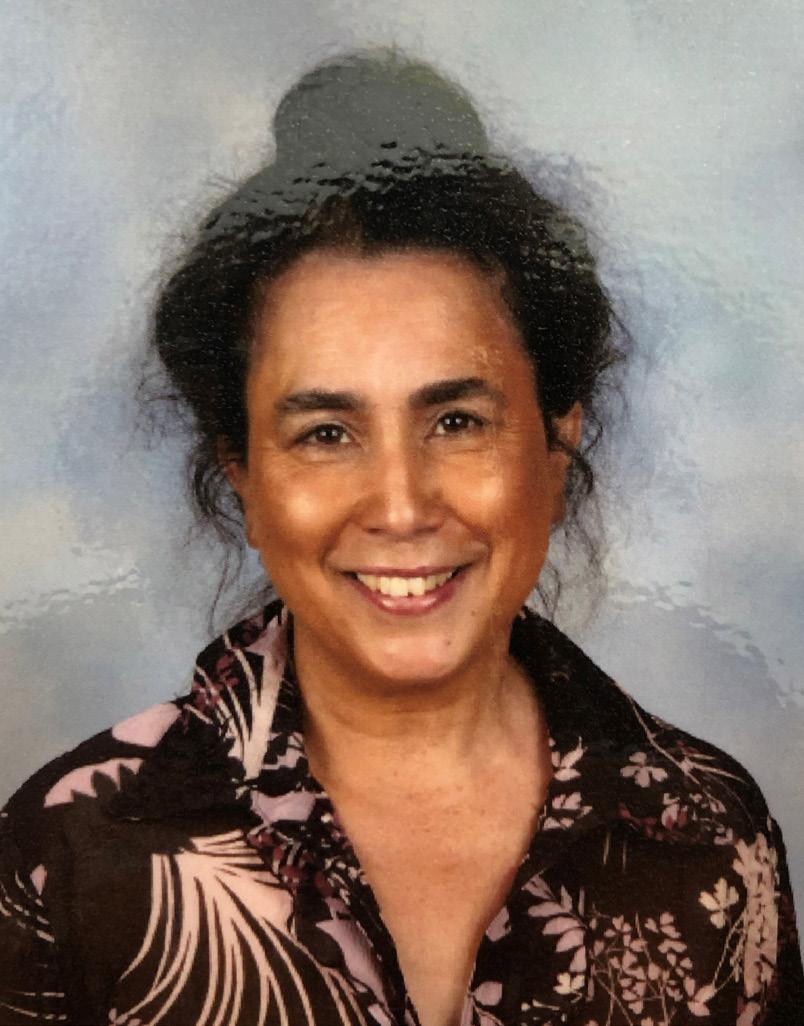
6 minute read
Case Studies

Case Study 1: Staff Connecting to Country
We encourage all employees to learn more about Aboriginal history and cultures, through participation in Connecting with Country Days under the cultural guidance of local Aboriginal Knowledge Holders. The structure of these experiences differs according to location. Each Centre contacts local Aboriginal people or agencies and organises to spend a day off site to meet, share and learn about the traditional cultures, histories, stories and practices (such as bush tucker, bush medicine and shell art) of the area where their Centre is situated. This initiative is a key element of the national Relationships Australia Indigenous Network cultural learning framework known as the ‘Cultural Fitness Package’.

Penrith staff learning with proud Darug Elder, Uncle Lex Dadd, near Red Hands Cave, Blue Mountains National Park Sydney City staff on their Connecting with Country Day at La Perouse under the cultural guidance of Jess Sinott from Koori Kinnections.






Case Study 2: Reflecting on Cultural Journeys
Creating collaborative art is a powerful way for people to come together to create understanding about reconciliation. Above is our large, colourful reconciliation artwork which adorns the lunchroom wall at our Macquarie Park head office and continues to spark conversations about the journey of reconciliation at RANSW. On this day, twenty employees from diverse backgrounds sat together around a large table, bibs on and paintbrushes in hand, to reflect on their own cultural journeys, the impact of colonisation on Aboriginal and Torres Strait Islander peoples and the meaning of reconciliation. They then expressed these reflections on canvas. Facilitated by Aboriginal artist, Danielle Mate Sullivan (a member of Supply Nation), and with the expertise and generosity of two of our Aboriginal employees, this thoughtful and fun activity started many conversations and offered an inclusive and safe environment for cultural sharing and learning from one another. Relationships were strengthened through personal stories shared.
daniellemate.com.au Certified Indigenous Business with Supply Nation
Case Study 3: Caber-ra Nanga Engage
Caber-ra Nanga is a Gaimaragal word meaning ‘resting the mind’. Caber-ra Nanga Engage is a partnership program delivered by RANSW funded by the Northern Sydney Primary Health Network (PHN). The program started in early 2017 in conjunction with the Gaimaragal Group, with RANSW providing culturally appropriate wellness activities for Aboriginal people in the Northern Sydney and Northern Beaches regions. In the first year of the program, a total of 34 clients accessed the service. From 2019 our target is to provide service to at least 75 people each year. The program employs an Aboriginal Community Engagement & Case Worker who provides oneon-one services to referred clients, group wellness activities including regular women’s healing circles, weaving groups, women’s and men’s groups, and is consulted on school based Aboriginal programs. Consultations are held with local Elders to ensure all activities are culturally appropriate. Caber-ra Nanga Engage hosts an annual public Wellbeing Day on the shores of Narrabeen Lake where agencies and service providers have an opportunity to share information with the public on a broad range of wellness services and products. Aboriginal families and Elders groups from NSW regions attend with dance, bush tucker walks, weaving circles and women’s healing circles held throughout the day. A large shared lunch brings everyone together in a sense of community in the middle of the day.




Case Study 4: Working in Bathurst Communities
As told by Selina Brandy Senior Aboriginal Family Advisor, RANSW Bathurst Centre.

Where shall I begin to tell you my journey of working with Community on Wiradyuri Country? Hello. My name is Selina Brandy (Wiradyuri, Bundjalung, Wailwan, Yorta Yorta woman). I have worked for five years as a Senior Aboriginal Family Advisor at our Bathurst Family Relationship Centre, primarily doing community development work. I’d love to share my journey with you. It has included learning and role modelling how to build connection and trust, what it means to be genuine and culturally safe. These are values I have been taught through the guidance of the Bathurst Wiradyuri and Community Elders who speak for the Country in this region. They are teachings which are important in building stronger families and stronger communities. My first community project was about cultural protocols and cultural manners. Central to this is acknowledging Wiradyuri Ancestors as they protect me while I am working and living on Wiradyuri Country. I was honoured that the Bathurst Wiradyuri Elders shared the teachings of Yindyamarra (a way of life) with me. This is Wiradyuri Lore which follows the five principles of showing respect, being polite and gentle, going slowly and honouring. These principles are so important in strengthening families and strengthening communities, and being inclusive of all sorts of differences such as culture, religion and gender in the broader community. A prime example of collaboration and inclusive practice here in Bathurst has been the longterm partnership between RANSW and the Bathurst Regional Council in support of the Kelso Women’s Group (KWG). Managed by our Centre, the KWG strengthens Aboriginal and non-Aboriginal women, their families and communities through a range of activities which foster healthy, sustained relationships and create opportunities for reconciliation. As a mark of respect, the Council invited KWG into the Kelso Community Hub and into the stakeholder loop, providing not only a low cost venue for meeting, but including KWG in regular stakeholder meetings, strategic planning and decision making and Community and Council events such as NAIDOC, White Ribbon and International Women’s Day. This allows KWG to have a culturally safe venue on which to meet, have a voice in local affairs, learn, share, create and connect with other people from all walks of life. Reconciliation has been both the strength and direction of this partnership, which began in 2014 and will continue into the future.
Case Study 5: Major Sponsor for Mental Health and Suicide Prevention in Aboriginal Communities in the Illawarra
Sport brings people together and weekend rugby tournaments are major drawcards for Aboriginal and Torres Strait Islander families in the Illawarra. Inaugurated in January 2019 with an aim to be an annual event, the ‘Battle of the Countries’ is an effective way of strengthening community and spreading a positive message about mental health and suicide prevention. In its first year, it attracted around 2,000 people, with 500 players ranging from under 13s to adults. Held on the land of the Wodi Wodi people of the Dharawal nation, it is an opportunity to spread a very strong positive message to players, their families and friends – to speak up, to look out for each other, and to provide information about mental health and suicide prevention services in the local area. Uncle Rod Broad, a local Dharawal/Yuin Elder and long-standing friend of Relationships Australia NSW, is the founder and key organiser, inspired to act following the tragic suicide of his own father. On the day, our Wollongong Manager, Janine McEvoy takes the opportunity to speak with teams, reminding them to not bottle things up and to make sure they talk with teammates, friends, family and professionals if they find themselves or others struggling with life issues. We look forward to supporting this initiative and the mental health of Aboriginal and Torres Strait Islander communities into the future.




